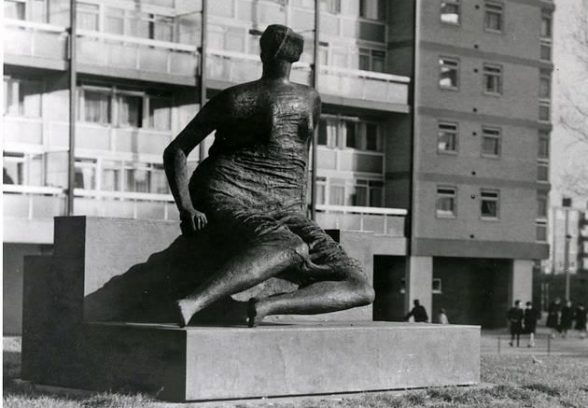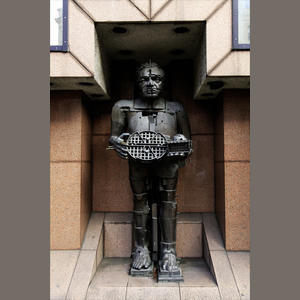This website uses cookies
This website uses cookies to enable it to function properly and to analyse how the website is used. Please click 'Close' to accept and continue using the website.




Next Tuesday night Henrietta Billings (our Senior Conservation Adviser) and I, are all set to talk about the Dorothy Annan murals on Farringdon Street. (it’s at the RIBA see here, and you can book on our website here). That’s a success story—we campaigned to have the set of nine ceramic panels spot listed; they were swiftly added at Grade II; and now the developers of the site are carefully moving them to a safe new location in the Barbican and consulting us on how they will be presented there.
However, we’ll also be drawing some more concerning cases to the audience’s attention. The spot-listing system failed to save the eight foot tall bronze self-portrait of Sir Eduardo Paolozzi as Hephaestus ( Greek God of Fire), commissioned in 1987 by the London and Paris Property Group for the front facade of their new offices at 34‐36 High Holborn. It has stood in a its very prominent location in a pavement level niche for twenty-five years, but although we argued that it should not be removed without Conservation Area consent, it was taken away and sold at auction earlier this month, as we were compiling our listing request. It leaves a large, and rather mournful gap. This, and the recent campaign (backed by Labour councillors) to keep Henry Moore’s Draped Seated Woman (affectionately known as ‘Old Flo’) in Tower Hamlets, shows just how vulnerable all forms of public art can be. Whilst other countries have legislation giving artists moral rights over their work for seventy years (so they get a say in what happens to pieces they have sold) we have nothing covering this, nor does it seem that there is any mechanism whereby works which local authorities negotiate to be put in public locations as a positive planning gain when they grant consent for a new building, must stay where they are put.
We think that this is an anomaly that needs to be urgently addressed, before more works are sold off for quick profit in recessionary times. Once they’ve gone, we can be sure they will not come back.

Become a C20 member today and help save our modern design heritage.
Comments